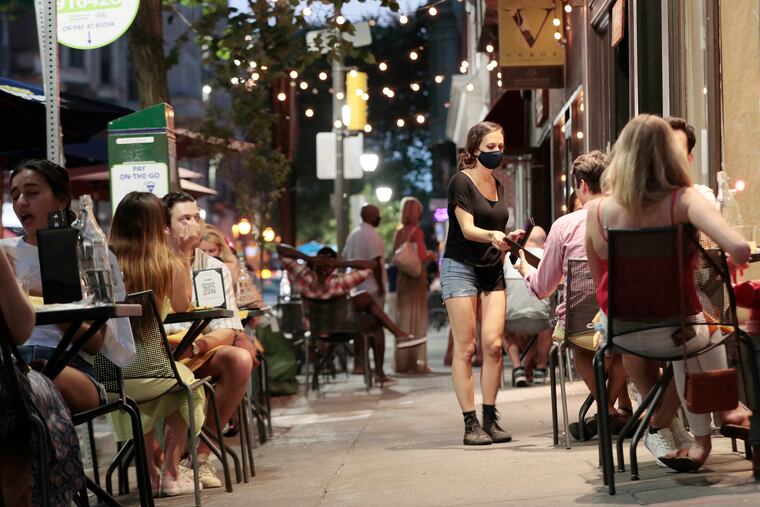Restaurant Week 2020: Good in theory but a service worker’s nightmare | Opinion
Restaurant Week is often hard on waitstaff because the restaurants are jammed with demanding bargain hunters who tip poorly. Can you imagine it will be any better during a pandemic?

Imagine going back to work during a pandemic, which has killed more than 190,000 Americans, to a workplace environment that is known to be high-risk and your employer telling you that you will be getting a pay cut while the risk is highest.
That’s exactly what is happening to Philadelphia’s service-industry workers in Center City.
Philadelphia’s Restaurant Week, which kicks off Sunday, is good in theory but a service worker’s nightmare.
It’s good in theory because it is supposed to rejuvenate interest in dining out after a summer of vacationing and jump-start the restaurant industry after a long, slow summer.
» READ MORE: Philly restaurants reopen dining rooms for the first time since March. Here are 10 spots to eat.
But in execution: It’s often a nightmare because the restaurants are jammed with demanding bargain hunters who tip poorly. That’s during normal times. Can you imagine it will be any better during a pandemic?
It is disappointing that while restaurant workers have faced enormous financial losses during the pandemic, the Center City District (CCD), the organization behind Restaurant Week, and participating restaurant owners are pushing forward with this year’s campaign, which will ultimately rob servers and workers of much-needed gratuities while risking their health and safety.
According to a report in the New York Times, a quarter of Louisiana’s COVID-19 cases outside of places such as nursing homes and prisons have come from bars and restaurants. Contact tracing in Maryland and Colorado has found similar results. Popular restaurants in cities like Nashville, Atlanta, Milwaukee, and San Diego have had to temporarily close because of cases among their employees. A taco restaurant in Spokane, Wash., had 24 customers and an employee all test positive even though the local health department officials confirmed that restaurant was adhering to all the recommended prevention practices.
Philadelphia has done a decent job of outlining safety precautions — such as not visiting if you have any symptoms or have been exposed to anyone with COVID, boxing up your own leftovers, and capping groups at four people. Even with those precautions in place, we know that indoor dining, which reopened Tuesday in Philadelphia, can still be a recipe for transmission.
» READ MORE: What are the new rules for indoor dining in Philly and Jersey?
By participating in Restaurant Week, restaurant owners are forcing their employees, many of whom make much of their income through tips, to work at a discounted rate in a high-risk environment. Providing meals at drastically discounted prices means that most diners will base their tip on the bill’s total — not the usual price of their food. The service workers I know tell me that tips are normally 30% to 35% lower per table during Restaurant Week.
Additionally, hosting Restaurant Week a mere five days after indoor dining resumes in Philadelphia feels like terrible timing as it allows restaurants only a few days to make sure the recommended safety methods and precautions are effective. Some people infected with COVID-19 do not even show symptoms in the first five days. If Restaurant Week must happen, it should at least be pushed further into the fall so that diners, restaurateurs, and health officials can understand the impact of indoor dining during a pandemic and make adjustments to guidelines as needed.
It’s worth noting that Restaurant Week is available for both dine-in or take-home options. If you are adamant about taking advantage of the discounted prices during Restaurant Week, take-home is the safer option for everyone involved. However, people tend to tip even less on take-home meals, so restaurant workers will still be facing financial strain.
» READ MORE: What servers want you to know as indoor dining resumes in Philly
The restaurant industry has been financially decimated by the COVID-19 restrictions. For an industry that already runs on razor-thin financial margins, providing hazard pay or other monetary bonuses to workers during Restaurant Week seems unattainable. But restaurant owners can and should at least institute a mandatory 30% gratuity that goes directly to staffers who are putting their lives on the line to make and serve food and drinks.
Everyone wants to get back to normal as quickly and as safely as possible, including dining at our favorite Philly restaurants. But that should not supersede the empathy and respect that we should have for the restaurant workers who make that normalcy possible for the rest of us. They should not be forced to work for discounted wages during Restaurant Week. Restaurant Week should be canceled.
» HELP US REPORT: Are you a health care worker, medical provider, government worker, patient, frontline worker or other expert? We want to hear from you.
Greg Caputo is cohost of The Philly Blunt Podcast, which is a Best of Philly-winning podcast that celebrates Philadelphia. He also has a blog in town called Jawnville: The Ramblings of a Philly Bloke (Jawnville.com). He is a former cook at Hooters and still has many ties to the service industry. @ViolationsGreg